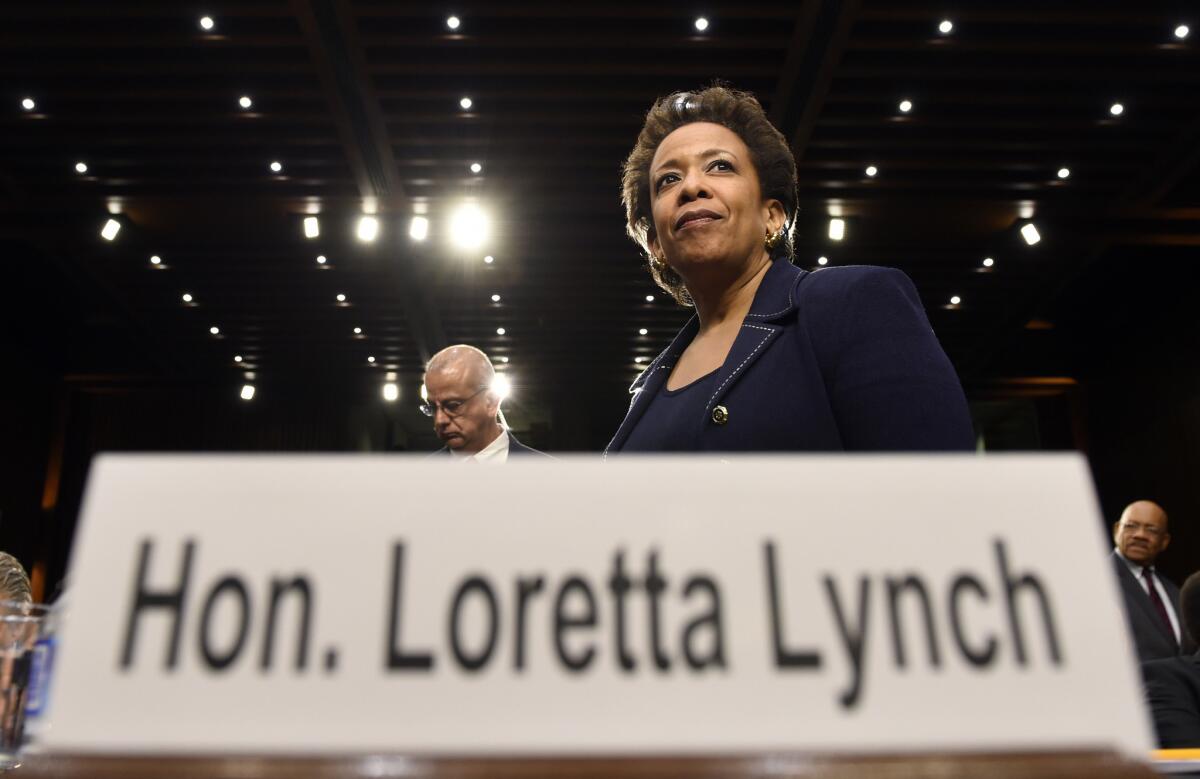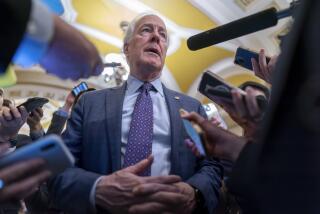Rancor worsens over attorney general nominee Loretta Lynch

The 5-month-old partisan battle over the nomination of Loretta Lynch to be attorney general got even nastier Thursday, as the White House traded unpleasantries with a key Republican senator and a leading Democrat threatened to try to force a vote.
Lynch was nominated in November and went before the Senate Judiciary Committee for hearings in January, but the chamber has yet to vote on her confirmation, making her wait the longest in decades for any attorney general nominee.
The Lynch standoff is unusual in that her record and qualifications are not questioned by either side. Rather, her nomination has been entangled in separate issues: immigration reform, abortion and, most recently, Hillary Rodham Clinton’s use of a private email server while secretary of State.
On Thursday, Senate Minority Leader Harry Reid (D-Nev.) surprised onlookers by announcing on that he had the power to force a vote on Lynch.
“I had a conversation today with a number of Republicans and told them really to get her done or I will make sure they will have an opportunity to vote against her,” Reid said on MSNBC.
Normally, votes are scheduled by the majority party, but Reid’s staff said he had found a loophole under which he could bring her up for a simple majority vote.
Lynch has 51 senators pledged to support her out of 100, but that includes a handful of Republicans who are not likely to support a vote over their party’s objection. Still, some Republicans may be loath to oppose the first African American woman nominated for the nation’s top law enforcement job.
Before senators can vote on Lynch, they must first vote on bipartisan human-trafficking legislation, Senate Majority Leader Mitch McConnell (R-Ky.) says. Republicans pulled back on a vote Thursday on that bill, which is tied up in a controversy over abortion funding for trafficking victims.
If the trafficking problem is not quickly resolved, a Lynch vote could be delayed for several more weeks as the Senate also takes up Iran sanctions legislation.
Also Thursday, White House spokesman Josh Earnest called Sen. Charles E. Grassley (R-Iowa), the chairman of the Judiciary Committee, “duplicitous” for blaming Democrats for the delay in Lynch’s confirmation after he demanded last fall that they wait on that vote until the Republicans took over the Senate in January.
Grassley’s spokeswoman, Beth Levine, fired back.
“If you believe the White House and Senate Democrats had Republicans’ best interests in mind when they delayed consideration of the Lynch nomination last fall, you hadn’t watched how Harry Reid ran the Senate,” she said. “It was abundantly clear then – just as it is now – that Senate Democrats’ priorities didn’t include the Lynch nomination.”
Grassley also criticized Sally Yates, the nominee for deputy attorney general, raising the possibility that her confirmation may also be delayed. Yates is serving in the role in an acting capacity.
Meanwhile, one Republican tried to tie Lynch to the controversy over Clinton’s email use. Sen. David Vitter of Louisiana assailed Lynch for failing to promise an investigation into the issue.
More to Read
Get the L.A. Times Politics newsletter
Deeply reported insights into legislation, politics and policy from Sacramento, Washington and beyond. In your inbox three times per week.
You may occasionally receive promotional content from the Los Angeles Times.







